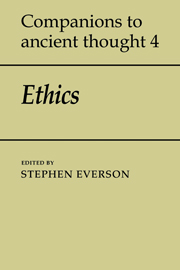Book contents
- Frontmatter
- Contents
- 1 Introduction: virtue and morality
- 2 Pre-Platonic ethics
- 3 Platonic ethics
- 4 Aristotle on nature and value
- 5 Some issues in Aristotle's moral psychology
- 6 The inferential foundations of Epicurean ethics
- 7 Socratic paradox and Stoic theory
- 8 Doing without objective values: ancient and modern strategies
- 9 Moral responsibility: Aristotle and after
- Bibliography
- Index of names
- Index of passages discussed
- Index of subjects
8 - Doing without objective values: ancient and modern strategies
Published online by Cambridge University Press: 05 June 2012
- Frontmatter
- Contents
- 1 Introduction: virtue and morality
- 2 Pre-Platonic ethics
- 3 Platonic ethics
- 4 Aristotle on nature and value
- 5 Some issues in Aristotle's moral psychology
- 6 The inferential foundations of Epicurean ethics
- 7 Socratic paradox and Stoic theory
- 8 Doing without objective values: ancient and modern strategies
- 9 Moral responsibility: Aristotle and after
- Bibliography
- Index of names
- Index of passages discussed
- Index of subjects
Summary
Before doing philosophy, we tend to think that people, actions and institutions are good or bad, praiseworthy or deplorable. That we are wrong to have these beliefs is a point on which ancient and modern sceptics appear to agree. Ancient sceptical arguments about proof, say, or perception, are different from modern analogues, and in important respects less radical. But when we read the arguments that Sextus Empiricus retails to the effect that nothing is by nature good or bad, they appear familiar.
The appearance is misleading, however; ancient and modern uses of, and reactions to, sceptical arguments about value are profoundly unalike. If this is so, then pointing it out is of more than historical interest; it alerts us to a number of interesting possibilities about value, and moral value in particular.
I shall begin by looking at the ancient arguments (few and easily surveyable, it turns out) which try to undermine our confidence that people and actions really are good or bad. I shall also look at the ancient sceptics' account of the benefits of having been convinced by these arguments. Then I shall consider what seem to have been the standard ancient objections to moral scepticism, and the strength of the sceptic's defence. Doing so will, I hope, bring out the radical difference between ancient and modern attitudes to sceptical arguments about moral value.
- Type
- Chapter
- Information
- Ethics , pp. 193 - 220Publisher: Cambridge University PressPrint publication year: 1998
- 2
- Cited by



